Clean Hard Water Stains Tile
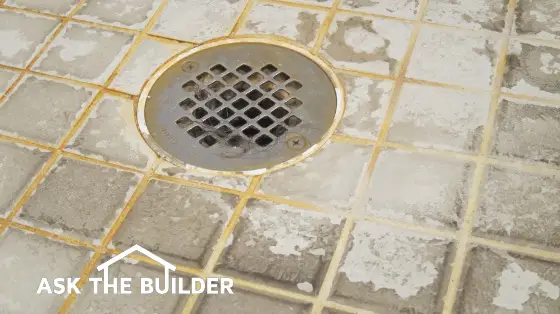
Clean Hard Water Stains Tile | This tile shower floor has nasty hard water stains. They can be cleaned easily with time and some household vinegar. © 2021 Tim Carter Builder
Clean Hard Water Stains TIPS
- Hard water stains caused by hard water minerals
- Use regular white vinegar and paper towels to remove
- Longer soak time means less scrubbing
- Prevent stains using a squeegee - see GREAT ONE below
- CLICK HERE to Get Tim's FREE & FUNNY Newsletter!
DEAR TIM: I’ll admit it. I’m not the best housekeeper and I’m frazzled. My tile shower floor is filthy with hard water stains. I don’t like using harsh chemicals for a number of reasons and because the stains are so hard to clean, I’ve neglected the floor.
Is there an easy way to clean hard water stains from tile? How is is done?
Or, do I have to rip out the tile and start over? Is there a way to prevent the hard water stains once I get the tile clean again?
Thank you Tim! Tom Y., Tampa, FL
DEAR TOM: Many people place a low priority on cleaning their homes for any number of reasons. Some are unable to do it, some are just too busy and some may not even see the dirt. The good news is that with minimal effort and a bottle of something you most likely have in your kitchen pantry and eat on a regular basis, you’ll have gleaming and clean tile in less than a day!
What is the Best Product to Remove Hard Water Stains?
The best product to remove pesky normal hard water stains is white vinegar. You can buy it at your grocery store in gallon jugs. You can have concentrated white vinegar solution delivered to your doorstep.
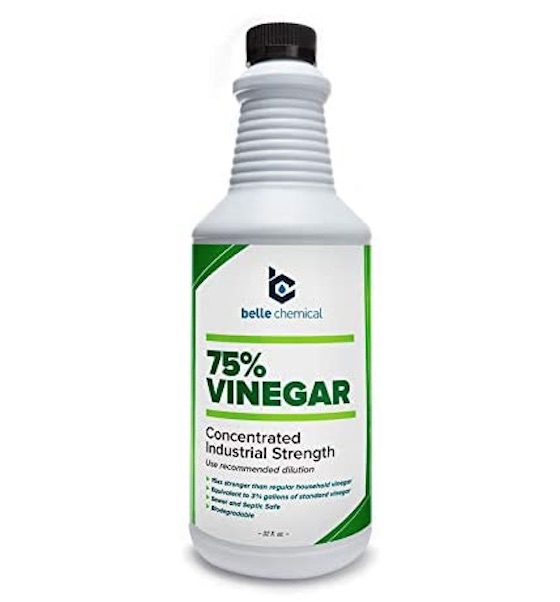
This is strong concentrated white vinegar. It will do a fantastic job of removing hard water deposits. CLICK or TAP HERE to have it at your doorstep in days.
Before I tell you how to clean the hard water stains from your tile floor, allow me to explain how they form. Once you understand this, then you’ll realize how easy it is to prevent them from happening in the future.
Free & Fast Bids
What Causes Hard Water Stains?
Hard water stains are caused by minerals in your water. Just about all tap water from your house faucets has dissolved minerals in the water similar to sugar being dissolved in coffee or salt being dissolved in water. Once the water dries, the minerals are left behind.
In many places in the USA, and across the world, the water coming from wells and municipal water pipes has dissolved minerals in it. The most common elements in these minerals is calcium and magnesium.
Do Minerals Make the Water Hard?
Dissolved minerals make the water hard as opposed to soft. Soft water feels slippery when you rub your hands together. You don’t have this sensation with hard water, thus the descriptor.
The hardness of water is measured in grains with one grain equal to one seven-thousandth of a pound. To put this in perspective a typical grain of wheat weighs the same and evidently it takes about 7000 grains of wheat to equal a pound. But I digress.
Why Do I See the Hard Water Deposits?
When hard water containing calcium and magnesium evaporates, the water component goes into the air as a vapor leaving an ultra-thin coating, often invisible, of the calcium and magnesium on the surface. You can test this easily if you have a dark countertop or piece of dark plastic.
Allow a drop of water to dry and you may see a very faint white ring of the crystals marking the outline of the drop as it shrinks and evaporates.
Do Hard Water Deposits Build Up in Layers?
Hard water deposits build up in layers each time you allow water to evaporate on top of an existing hard water deposit.
If you don’t clean off these deposits on a regular basis in a shower floor, each time you get into the shower with dirty feet, you press tiny dirt particles into the fresh mineral crystals.W
hen you get out of the shower and the water on the floor dries another layer of new crystals locks in the last layer plus the new dirt. Can you see what happens if you do this for months on end? You end up with a layer cake of hard water deposits and dirt.
Will Mild Acid Remove Hard Water Deposits?
Yes, mild acids like citric acid and acetic acid will dissolve hard water deposits. White vinegar is a mild acetic acid.
I’d like you to now recall some of your high school chemistry. The hard water deposits are alkaline in nature. This means they have a pH greater than 7. If you pour an acid which has a pH less than 7 onto the hard water deposits, they’ll soften and start to dissolve.
But as you indicated, you don’t want to use harsh chemicals and many acids are harsh. Guess what? Common white vinegar that you use to cook with and put into your body is a mild acid. It’s safe and non-toxic.
How Long Should the Vinegar Soak?
The white vinegar should be allowed to soak for hours. The best thing is to do an overnight test.
Here’s all you need to do to remove the hard water stains from your shower tile floor. For real impact, I only want you to do this on half the floor. Make sure the tile floor is dry.
Put a double layer of dry paper towels on half the tile. Saturate the towels with pure white vinegar. Really soak the paper towels with the vinegar.
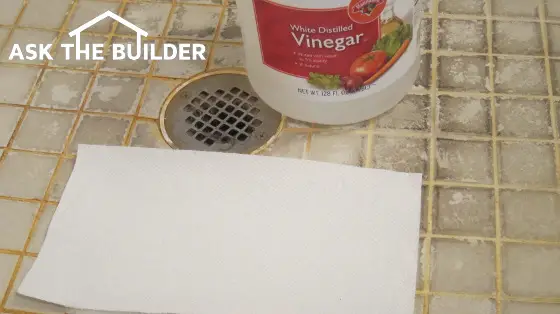
The paper towels have been spread and the vinegar is about to be poured! It's best to let the vinegar soak on tiles like this for at least eight hours. © 2021 Tim Carter Builder
How Do You Apply Vinegar to Wall Tile?
You apply vinegar to the wall tile by saturated paper towels with the vinegar. Then press them against the stained wall tile pressing out all air bubbles. Just imagine the paper towels are wallpaper.
IMPORTANT TIP: You'll have to spritz the paper towels with fresh vinegar every 30 minutes as gravity will pull it out of the paper towels to the floor.
How Long Should the Vinegar Stay on the Wall Tile?
Allow the vinegar to sit on the tile for at least eight hours, possibly more. At the end of the wait period, squeeze out the paper towels and throw them away.
Before you get into the shower, scrub the floor with a stiff scrub brush where the paper towel was and around the towel.
Dramatic Before, During & After Photos
A wonderful woman, Saskia, who lives in Palos Verdes Estates in California read all of my hard-water-stain-removal columns. She decided to try the white vinegar method. Here's what she sent to me:
"I cannot thank you enough! We moved into our new home 7+ years ago. We have a lovely fountain in our entrance. Over time, the tile became whitened and crusty. I don't think we paid much attention at first--it happened gradually.
Recently, after a trip, I looked at it and was horrified. I googled how to clean tile and was directed to your site. My husband thought the discoloration was from the bleach we used to keep the fountain pool water clean, but I knew it was calcium.
The first picture is of the original tile. The second is after 24 hours of a sponge sitting on the tile, soaked in 100% vinegar, per your instructions.
The last is our final result after a month(!!!) of soaking and some gentle scraping with a razor blade at a 30-degree angle.
You're the very best. I was ready to use some nasty corrosive stuff, but this was so much better and did the job beautifully.
THANK YOU!"
Saskia - Palos Verdes Estates, California
Fortunately she took photos of the process. Here they are:
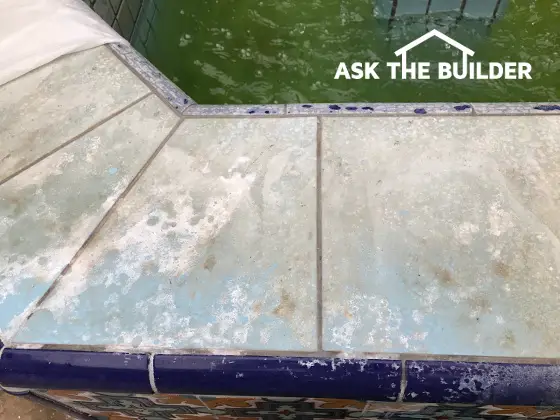
Here's Saskia's fountain edge. This is before she started to work with the vinegar. Copyright 2021 Tim Carter
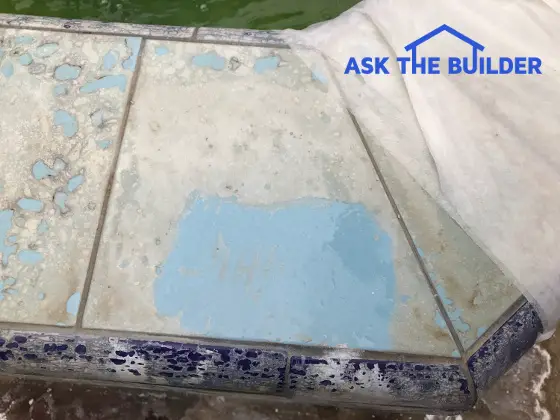
You can clearly see where the sponge rested all night. Don't you wish you would have paid more attention in your high school chemistry class? Copyright 2021 Tim Carter
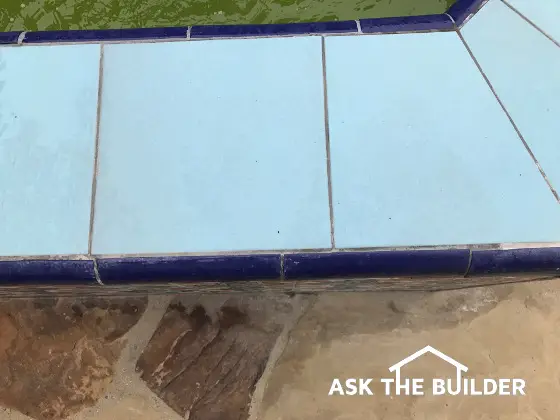
What a transformation!! Harsh acids could have RUINED the tile and grout. Patience is everything. Copyright 2021 Tim Carter
Will Vinegar Create a Slippery Scum?
Sometimes vinegar can react with soap scum and create a slippery mess and you could fall if you don't clean it before stepping on the slime. Be sure to rinse well and check the area with your hand to ensure it's not slippery.
After scrubbing, the tile might look like new or there should be far less hard water deposits.
How Do I Get Rid of Tough Hard Water Deposits?
Tough hard-water deposits may require multiple applications of vinegar and multiple scrubbing attempts. If you see progress after the first application of vinegar, you know it's going to work in the long run.
If there’s a great improvement but the tile doesn’t look like new, you just have to repeat the process to get the tile looking perfect. There’s no need to scrub the tile with a harsh abrasive cleaner that can scratch the fine clear glaze on the tile.
Should I Test Vinegar on Marble?
You must test vinegar on marble. Marble is an alkaline stone and it's possible a strong vinegar could etch the surface or reduce the polish level.
Do NOT do this with any marble surface without carefully testing with a cotton swab. Marble is alkaline and the vinegar might etch and remove some of the polish from marble.
Carefully test using any acid on marble. Apply a drop of vinegar in a place not too noticeable and let it set for hours. Rinse and see if the finish of the marble has changed.
How Do I Prevent Hard Water Stains?
Hard-water stains are prevented by removing any water from the tile or other surfaces. I use a squeegee at my home.
Keeping your tile looking like new from now on after you get all the hard water deposits removed is easy. Purchase a high-quality squeegee with a good rubber blade.
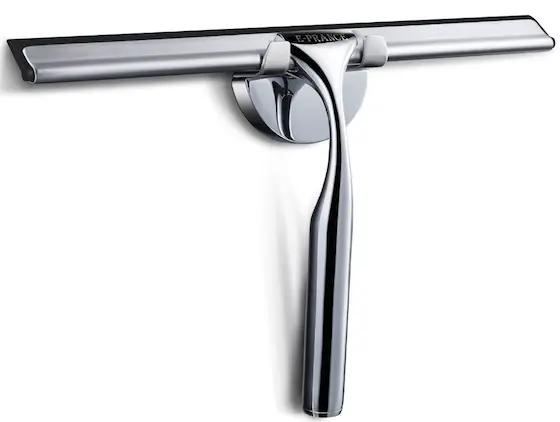
This is a great squeegee. I have it in my own shower at my home. I love the suction-cup holder for it. CLICK THE PHOTO NOW TO HAVE THIS DELIVERED TO YOUR HOME IN DAYS.
After each shower use the squeegee like a window washer cleans glass to remove all the water from the walls and floors. Get as much water as possible into the drain. If there’s no water to evaporate on the tile, there will be no hard water deposits.
How Often Should I Use Vinegar?
I’d also just get in the habit of using the vinegar every two weeks to keep ahead of any minor deposits that may develop because you can’t get all the water off the tile. Let me know what happens. Actually I already know that you’ll have success, but I’d still like to read your joyful email!
Column 1164
17 Responses to Clean Hard Water Stains Tile